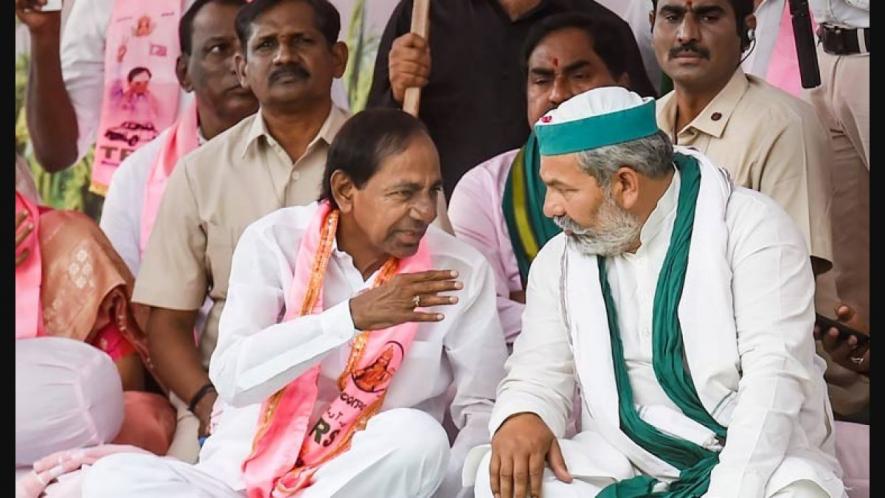KCR Sympathises With Farmers’ Protest, Ignores Plight of Telangana Tenant Peasants

Image Courtesy: PTI
Telangana chief minister (CM) K Chandrashekar Rao (KCR) has been talking about an ‘alternative agenda’ in politics without the Bharatiya Janata Party or the Congress at the national level for some time now.
As part of his national tour to mobilise like-minded politicians in different states, KCR announced financial assistance to the families of farmers killed during the movement against the repealed farm laws in the presence of his Delhi and Punjab counterparts Arvind Kejriwal and Bhagwant Mann at a public function in Chandigarh on May 22.
At the event, KCR spoke about the challenges faced by the farmers and said that peasants have the potential to change governments—forgetting the high rate of suicides committed by farmers in Telangana when they fail to repay loans taken from moneylenders and landlords.
KCR claimed that after the Telangana Rashtra Samithi (TRS) came to power with the formation of Telangana in June 2014, the average number of 15-20 daily suicide cases among farmers has reduced. The number of deaths by suicide has definitely reduced but National Crime Records Bureau (NCRB) data show that it is still more than 450 annually—898 in 2014, 1,358 in 2015, 632 in 2016, 846 in 2017, 900 in 2018, 491 in 2019 and 466 in 2020. Telangana was among the top six states accounting for 83% of such deaths in 2019.
As per the Indo-Global Social Service Society report, 2017, most suicides are committed by the small, marginalised and tenant farmers. A study conducted by NGO Rythu Swarajya Vedika and the Tata Institute of Social Sciences, Hyderabad, found that 75% of the total number of farmers who committed suicide in 2014-18 were tenant farmers. Additionally, under the social category, 61% of the farmers were from Other Backward Class, Scheduled Castes (17%) and Scheduled Tribes (11%).
Ironically, as KCR expressed sadness at the sacrifices of the farmers from Punjab and Haryana even after 75 years of independence, the CM and his party have been apathetic to the plight of marginalised tenant farmers in his own state.
One of the promises in the TRS 2014 election manifesto was the distribution of three acres to each Dalit farmer. However, in later schemes intended for the welfare of farmers, Rythu Bandhu and Rythu Bhima, the state ignored tenant farmers with exclusionary clauses making the schemes beneficial to only farmers owning land.
A video after Rythu Bandhu was implemented in 2019 showed KCR replying to an opposition party member about the inclusion of tenant farmers: “... We are aware of the tenant farmers. As I said in this Assembly prior to the December 2018 election, we stand by farmers as I know the struggle of farmers. I come from a farmer family with ancestral land … As a responsible person, I appealed to farmers (landowners) that as we increased the amount of the Rythu Bandhu scheme from Rs 4,000 to Rs 5,000, they should share some money with the tenant farmers on humanitarian grounds.” Since sharing was a business relationship between the landowner and the tenant, he added, it was not his government’s responsibility.
Congress MLA Rajgopal Reddy later said that he himself unnecessarily received Rs 3 lakh under the scheme with similar cases of rich farmers, politicians and government officials (who are not farmers but rather absentee landlords coming from landowning farmer families) receiving extended monetary benefits under the scheme. He recommended reconstitution of the scheme to include tenant and poor farmers, who do 70% of the cultivation and are depended entirely on agriculture for livelihood.
In addition to the exclusion of tenant farmers from these schemes, the recent approval of several urban development projects like the six-lane Regional Ring Road and residential ventures have left SC, ST and OBC farmers with an even more uncertain future.
The struggle of lower-caste landless farmers in the 1970s resulted in the enactment of the Andhra Pradesh Land Reforms Act, 1973. Under the Act, a number of farmers from marginalised communities were assigned one to four acres for cultivation. While it took the farmers almost 20 years to make these assigned lands cultivable, the state government has started pooling these plots for the development of Hyderabad.
Telangana will celebrate the ninth year of its formation on June 2. The statehood was achieved after decades of movement involving people from all sections of society. The formation of Telangana and the 2014 TRS manifesto gave hope to small, marginal and tenant farmers about land ownership.
Tenancy itself has been the result of historical and systematic caste-based and ethnic discrimination by upper and dominant caste landowning farmers, or the landlords. Still, the Telangana government continues to deprive tenant farmers of schemes meant for their welfare. With KCR publicly washing his hands off tenant farmers in his state, the sympathy for their peers in Punjab and Haryana is meaningless.
The writer is a postgraduate student and researcher on policy and social justice at the International Institute of Social Studies, Erasmus University Rotterdam. Hailing from Telangana, he graduated from TISS, Hyderabad, and worked at Libtech-India.
Get the latest reports & analysis with people's perspective on Protests, movements & deep analytical videos, discussions of the current affairs in your Telegram app. Subscribe to NewsClick's Telegram channel & get Real-Time updates on stories, as they get published on our website.
























